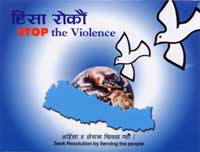This may be a good time to ask what the wars in Sri Lanka and Afghanistan actually achieved. What was the sense in all that carnage? Did the freedom fighters achieve what they set out to? Whatever the cause, can mass misery on such a scale for such a long time ever be justified? What is an acceptable price to pay for freedom and self-determination? Who really benefited besides the arms merchants?
We ask these questions as Nepal itself lunges towards a similar abyss. Even in Jaffna or the Panjshir Valley, it would be rare to see the kind of casualty levels we saw last month in Achham and Salyan.
If this is the prevalent kill rate at the beginning of our own conflict, we shudder to think how it will all end. Have the architects of this revolution pondered where this is taking us? Who gave them the right to determine our destiny? Is violence really the shortcut to power that they think it is?
After 65,000 people are killed, Prabhakaran is willing to compromise on the single most important goal of his struggle: an independent Tamil homeland. Will it take twenty years and 100,000 dead Nepalis for our comrades to say, oops, it looks like armed struggle was a dead-end street, now let's talk. It may be safe to say that by that time there may be no Nepal, and nothing left to talk about.
It is so much easier to wallow in cynicism and despair, and to look erudite while taking on a hopeless pose. It is hard to sound confident and harder still to be credible standing amid the carnage to say: all is not lost, we must pull ourselves together. To take an existentialist perspective amidst all this, we remind ourselves that in the end there is no choice but to assert our humanity amid so much inhumanity.
What is worrisome is the desperation of those who will benefit from the coming anarchy. And there is a danger of society becoming irreversibly brutalised, our instinctive humanity smothered by blind anger and bad blood. It gets debilitating writing and thinking about these things day after day. There is a sense that we are collectively dragging each other down, and we will all end up in the muck of violence, corruption and greed. Every day, good people are being brought down by the wealth, audacity and sheer persistence of those who benefit from a system that has lost morality and purpose.
Valuing values
 It looks bad, but maybe the country needs to be brought to the brink to peer into the chasm before it can pull back. This is why sober voices are needed, voices that rise above the din, statesmanship that keeps these voices clear and pure. That is the only way we can pull through, by not allowing events to overwhelm us as individuals and as a society.
It looks bad, but maybe the country needs to be brought to the brink to peer into the chasm before it can pull back. This is why sober voices are needed, voices that rise above the din, statesmanship that keeps these voices clear and pure. That is the only way we can pull through, by not allowing events to overwhelm us as individuals and as a society. The lesson of Sri Lanka is never to let the grievances of minority communities and the disenfranchised pile up. And if they already exist, to begin to redress them. The oppressed have nothing to lose, and if their aspirations are subdued for long enough they will rise up, with or without an ideology. And they will not need to call themselves Maoists, or Zapatistas, or Naxalites.
The lesson of Afghanistan is that it is bad enough addressing the concerns of domestic militancy, but interference from regional and global superpowers takes the war to a whole new dimension. One power's freedom fighter then becomes another power's terrorist as they all just become proxies in the great games of outsiders.
Defusing uprisings necessarily means taking away the reason for revolt: providing health care, education and jobs to those in desperate need of them, giving hope to those without it. In post-1990 Nepal we saw that just giving an impatient people freedom and a right to elect their leaders is not enough. Democracy must deliver development so people can value freedom.


